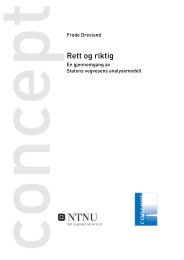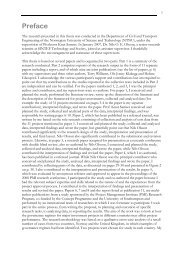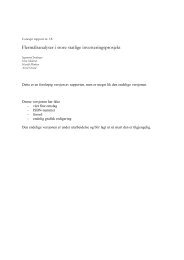2. RESULTSThe arguments against and in favour of project flexibility are summarised in the following. Differentstakeholders in a project have different perspectives on flexibility. Flexibility is also seen differentlydepending upon the different phases of a project. The context and type of a project also influence theattitudes <strong>to</strong>ward and benefits of flexibility.The case against project flexibilityA wide range of studies and authors (including Morris & Hough, 1984; Eikeland, 2001 and Love et al.2003) have pointed <strong>to</strong> changes in specifications as a key driver in cost overruns of projects. Changeorders are widely seen as undesirable, even if contrac<strong>to</strong>rs do see them a possibility <strong>to</strong> improve the profitfrom the projects (Christensen & Gordon, 1998). Once a project has been decided upon and theplanning and execution has begun, changes will often reduce the efficiency of the project. Changeorders are also a source of major disagreements between different ac<strong>to</strong>rs in projects.Morris & Hough (1991) specifically argue against concurrency between development and production.Miller & Lessard (2000) point out the irreversibility of large engineering projects and the importance ofbold commitment from key stakeholders, arguing against flexibility once the front-end phase is over.Flexibility commonly is seen as undesirable in the execution phases of projects. The high andunpredictable cost of change orders is the key argument against flexibility. The negative consequencesof the use of flexibility in projects are also emphasised by project stakeholders that are responsible forthe execution of projects, such as contrac<strong>to</strong>rs. The potential for utilising flexibility in civil engineeringprojects is seen as limited, due <strong>to</strong> their indivisibility and irreversibility. Arguments such as “we do notbuild half a bridge” are used. There is also the possibility that visualising flexibility in a project, such asthe openings for later adjustments or even cancellation, will reduce the likelihood that the project willbe approved and carried out as planned. In such a perspective, commitments, not adjustability, arerequired <strong>to</strong> communicate credibility <strong>to</strong> affected parties.The case in favour of project flexibilityKreiner (1995) points out that the traditional focus on stability in project management becomeschallenged under uncertainty, which creates what he calls “drifting environments”. A number ofscholars, including Mintzberg (1994) and Bettis & Hitt (1995), argue that flexibility is necessary inorder <strong>to</strong> face the changes, uncertainty and turbulence in the business environment.The real options paradigm (for example Amram & Kulatlaka, 1999) illustrates that uncertainty canincrease the owner’s value of a project, as long as flexibility is preserved and resources are notirreversibly committed.Miller & Lessard (2001) lists "late locking" as a key success criterion for large engineering projects,along with an exploring, iterative front-end process. Hall (1980) suggests a risk-avoiding strategy,based on minimal commitments at each stage where decisions are necessary. He argues for anincremental or adaptive approach, rather than creating new projects. He suggests enlargements andadaptation of existing projects rather than building new ones, whenever possible.Modern approaches <strong>to</strong> development of IT-systems include functional specifications and iterativedevelopment. This is described by authors such as Poppendieck & Poppendieck (2003) and Boehm &Turner (2003).Most authors agree on the value of flexibility in the front-end phase of projects. Flexibility is alsogenerally seen as an advantage in industrial development project (Verganti, 1999). Clark & Fujimo<strong>to</strong>(1991) and Midler (1995) illustrate this based on the au<strong>to</strong>motive industry. The benefits of flexibility areeasier <strong>to</strong> visualise and implement in industrial development projects than in more standardised civilengineering projects. Flexibility is more valued by the stakeholders that have a responsibility for theoverall profitability or societal benefit of a project, compared <strong>to</strong> those who are only responsible for thecost side of the project.3
3. CONCLUSIONSWhat seems <strong>to</strong> be implied by authors quoted above is that flexibility is primarily useful <strong>to</strong> improveeffectiveness of projects rather than efficiency. The arguments in favour of flexibility emphasise thepossibility for increased effectiveness while the arguments against highlight the problem of reducedefficiency. Flexibility is often seen as a threat <strong>to</strong> delivering the project on time and within budget. Insuch a perspective, a project needs <strong>to</strong> be clearly defined in the front-end phase and executed according<strong>to</strong> the plans with as few adjustments or remaining decisions as possible, in order <strong>to</strong> maximiseefficiency. On the other hand, flexibility is also seen as a help <strong>to</strong> achieve the project’s purpose. Aproject with sufficient flexibility <strong>to</strong> utilize opportunities <strong>to</strong> increase the value for owners and usersmight in the end prove <strong>to</strong> be more effective.The literature gives indications as <strong>to</strong> whom and when flexibility is beneficial or harmful: The financing party or owner is more likely <strong>to</strong> be interested in flexibility than the contrac<strong>to</strong>r On average, flexibility in the front-end phase increases the probability of success The active use of flexibility in the execution phase is likely <strong>to</strong> reduce efficiency Industrial development projects, including IT system development, are more likely <strong>to</strong> benefitfrom flexibility than civil engineering projects are Flexibility appears desirable in high uncertainty environments and less important in situationswith low uncertaintyChange orders are not popular and flexibility may increase the probability of changes. However, achange requires that something already has been decided. The logic behind late locking of projects andthat a decision shall not be taken until it really has <strong>to</strong> means that changes should be reduced by lockingsolutions as late as possible.Flexibility appears as a double-edged sword: the flexibility for one project stakeholder can be another'srisk. The case against project flexibility highlights the negative effects of changes along with thepossibilities for frustration due a lack of decisions and commitment. Flexibility can thus be used <strong>to</strong>justify the opinion that decisions do not need <strong>to</strong> be taken or can always be revised. On the other hand,the case for project flexibility emphasises the possibility <strong>to</strong> utilise opportunities that arise and <strong>to</strong>manage the uncertainty, particularly in the front-end phase of projects.Finally, project flexibility is found <strong>to</strong> not necessarily be a question of good or bad, right or wrong. Withproper precaution and knowledge, the drawbacks of flexibility might be avoided or reduced and thebenefits utilised.REFERENCESAmram, M., Kulatlaka, N., 1999. Real Options : Managing Strategic Investment in an UncertainWorld, Financial Management Association Survey and Syn<strong>thesis</strong> Series, Harvard Business SchoolPress, Bos<strong>to</strong>n.Ballard, G., Howell, G.A., 2003. Lean project management, Building Research & Information, Vol 31,issue 2, pp 119-133.Bettis, R. A., Hitt, M. A., 1995. The New Competitive Landscape, Strategic Management Journal, Vol.16, 7-19.Blakstad, S. H,. 2001, A Strategic Approach <strong>to</strong> Adaptability in Office Buildings, Ph.D. Thesis, theNorwegian University of Science and Technology.Boehm, B., Turner, R., 2003, Observations on Balancing Discipline and Agility, Proceedings of theAgile Development Conference ADC’03, IEEE Computer Society.Brand, S., 1994. How Buildings Learn, What happens After They’re Built, Viking Penguin, PenguinBooks USA Inc., NY.4
- Page 1 and 2:
ISBN 82-471-8121-5 (printed ver.)IS
- Page 3:
Preface and AcknowledgementsThe wor
- Page 7 and 8:
Table of ContentsPreface and Acknow
- Page 9 and 10:
Paper OverviewThe following papers
- Page 11 and 12:
AbstractTraditionally, projects ten
- Page 13 and 14:
alternative use. There are indicati
- Page 15 and 16:
1. Introduction1. IntroductionThis
- Page 17 and 18:
1. IntroductionFlexible projects ar
- Page 19 and 20:
1. IntroductionA literature review
- Page 21 and 22:
2. Study design2. Study designThe r
- Page 23 and 24:
2. Study designInformation Content
- Page 25 and 26:
3. Flexibility in different project
- Page 27 and 28:
3. Flexibility in different project
- Page 29 and 30:
3. Flexibility in different project
- Page 31 and 32:
4. Project stakeholders4. Project s
- Page 33 and 34:
4. Project stakeholdersmandatory qu
- Page 35 and 36:
4. Project stakeholdersBased on res
- Page 37 and 38:
5. Effectiveness and efficiency5. E
- Page 39 and 40:
5. Effectiveness and efficiencyconf
- Page 41 and 42:
5. Effectiveness and efficiencyDegr
- Page 43 and 44:
6. Project flexibility categorisati
- Page 45 and 46:
6. Project flexibility categorisati
- Page 47 and 48:
6. Project flexibility categorisati
- Page 49 and 50:
7. Conclusions7. ConclusionsThis th
- Page 51 and 52:
7. ConclusionsProject phasesFlexibi
- Page 53 and 54:
7. ConclusionsEnablersThis thesis r
- Page 55 and 56:
7. Conclusions16, Figure 17, and Fi
- Page 57 and 58:
7. Conclusions4. AbsorptionAbsorpti
- Page 59 and 60:
7. ConclusionsThere appears to be a
- Page 61 and 62: ReferencesAbbot, A. & Banerji, K. 2
- Page 63 and 64: Gareis, R. 2004. Maturity of the Pr
- Page 65 and 66: Miller, R. & Lessard, D. 2000. The
- Page 67 and 68: Part 2.
- Page 69 and 70: Paper 1.Olsson, N.O.E. 2006. Manage
- Page 71 and 72: N.O.E. Olsson / International Journ
- Page 73 and 74: N.O.E. Olsson / International Journ
- Page 75 and 76: N.O.E. Olsson / International Journ
- Page 77 and 78: N.O.E. Olsson / International Journ
- Page 79 and 80: Paper 2.Magnussen, O.M. & Olsson, N
- Page 81 and 82: 282 O.M. Magnussen, N.O.E. Olsson /
- Page 83 and 84: 284 O.M. Magnussen, N.O.E. Olsson /
- Page 85 and 86: 286 O.M. Magnussen, N.O.E. Olsson /
- Page 87 and 88: 288 O.M. Magnussen, N.O.E. Olsson /
- Page 89 and 90: Projects trapped in their freedom:
- Page 91 and 92: 1. IntroductionThe purpose of this
- Page 93 and 94: project phases: preparation, freezi
- Page 95 and 96: establish realistic cost and time f
- Page 97 and 98: 4. ResultsIn the following, the emp
- Page 99 and 100: lowered the quality but the volume
- Page 101 and 102: Percent ofproject onSize of remaini
- Page 103 and 104: flexibility is introduced by the us
- Page 105 and 106: 100 %First official estimateApprova
- Page 107 and 108: ReferencesAndersen, B., Fagerhaug,
- Page 109 and 110: Paper 4.Olsson, N.O.E. 2004. ‘Fle
- Page 111: The concept of project flexibilityF
- Page 115 and 116: Paper 5.Olsson, N.O.E. 2006. ‘Imp
- Page 117 and 118: 558 N. O. E. Olsson et al.ex-post s
- Page 119 and 120: 560 N. O. E. Olsson et al.Table 1.O
- Page 121 and 122: 562 N. O. E. Olsson et al.and actua
- Page 123 and 124: 564 N. O. E. Olsson et al.Table 3.
- Page 125 and 126: 566 N. O. E. Olsson et al.Table 7.S
- Page 127 and 128: 568 N. O. E. Olsson et al.with a wi
- Page 129 and 130: Paper 6.Henriksen, B., Olsson, N. &
- Page 131 and 132: In this paper we use the process an
- Page 133 and 134: PROCESS ANALYSIS IN THE PLANNING OF
- Page 135 and 136: final framework for expected patien
- Page 137 and 138: User involvement also generated exp
- Page 139: Paper 7.Olsson, N.O.E. & Samset, K.
- Page 155 and 156: Project flexibility and front-end m
- Page 157 and 158: uncertainty. External flexibility c
- Page 159 and 160: 5.2. Flexibility in decision proces
- Page 161 and 162: Degree of redundancySlackPrecisionC
















